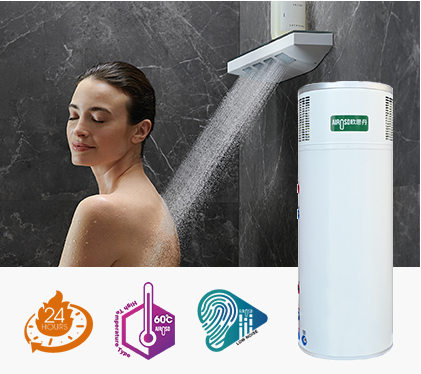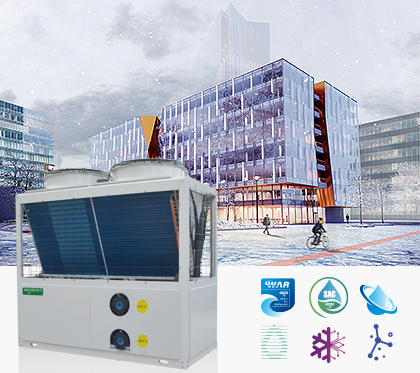Heat pumps have gained popularity in recent years as energy-efficient and eco-friendly heating and cooling solutions for homes and businesses. However, one common question that arises among potential users is whether heat pumps use a lot of energy. In this article, we will delve more into whether they use a lot of energy.
Understanding Heat Pump Operation and Energy Usage
Heat pumps have become a go-to for those seeking efficient temperature control without the heavy energy consumption often associated with traditional HVAC systems. A heat pump functions on a simple principle: it moves heat rather than generating it from scratch. In the chill of winter, it acts as a 'heat collector,' drawing warmth from the outside air—even when it's cold—and funneling it indoors. Conversely, during the heat of summer, it reverses direction, acting much like an air conditioner to expel indoor heat to the outside. This dual capability for heating and cooling makes it a versatile, year-round system for maintaining comfort with potentially lower electricity usage compared to conventional systems.
Energy Efficiency Of Heat Pumps
When considering the energy efficiency of heat pumps, it's important to note that these systems excel in their ability to transfer heat with minimal electricity usage. Unlike traditional heating and cooling units that must generate temperature extremes, heat pumps redistribute existing warmth or coolness, requiring far less energy. This distinction is critical in understanding why heat pumps are often seen as a more energy-conscious choice, capable of delivering significant energy savings and more affordable energy bills for homeowners and businesses alike.

Heating & Cooling & Hot Water Heat Pump
Factors Affecting Energy Consumption
Several factors can influence the energy consumption of heat pumps:
Climate
Heat pumps work efficiently in moderate climates, as they can extract heat from the air even at lower temperatures. In severely cold climates, efficiency may suffer, resulting in somewhat greater energy use.
Insulation And Home Design
Well-insulated houses with adequate sealing and energy-efficient designs can improve heat pump efficiency overall. Conversely, poorly insulated homes may cause the system to work harder, leading to increased energy usage.
Thermostat Settings
Optimal thermostat settings can play a crucial role in regulating energy consumption. Setting the thermostat at the right temperature can prevent overuse of the heat pump.
Heat Pump Size
Choosing the right-sized heat pump for your space is essential. An large unit may often cycle on and off, wasting energy, whereas an undersized unit may struggle to satisfy heating or cooling demands.
.png)
Tips For Improving Heat Pump Efficiency
To ensure your heat pump operates at peak efficiency and uses minimal energy, consider the following tips:
Regular Maintenance
Schedule regular maintenance checks to keep your heat pump in top condition. Clean or replace air filters, check refrigerant levels, and inspect the system for any issues that may affect its efficiency.
Regular Filter Replacement
Clean air filters are essential for the smooth operation of a heat pump. Clogged or dirty filters can restrict airflow, forcing the system to work harder and consume more energy. Check and replace filters on a regular basis, following the manufacturer's instructions.
Programmable Thermostat
Invest in a programmable thermostat that allows you to set specific temperatures for different times of the day. This allows you to optimize energy use depending on your everyday habits.
.png)
Heat Pump Water Heater Manufacturer In China
Sealing And Insulation
Seal any air leaks and increase your home's insulation to avoid heat loss in the winter and gain in the summer. This reduces the burden on your heat pump.
Optimal Temperature Settings
Setting the thermostat to the optimal temperature can significantly impact energy consumption. During the heating season, set the thermostat to a comfortable but moderate temperature, such as 68-72 degrees Fahrenheit (20-22 degrees Celsius). Aim for 74-78 degrees Fahrenheit (23-26 degrees Celsius) throughout the cooling season. Avoid using aggressive settings since they might waste energy.
Conclusion
In summary, while heat pumps can be incredibly energy-efficient and are designed to keep your space comfortable without excessive electricity usage, their performance is contingent on several factors. By understanding and managing these variables, such as climate, insulation, and thermostat settings, you can maximize your heat pump's energy efficiency. Moreover, with regular maintenance and smart usage, heat pumps not only promise reduced energy consumption but also offer a sustainable way to reduce your carbon footprint. For those asking, "Do heat pumps use a lot of electricity?" the answer is clear: with the right practices, they can be one of the most energy-efficient options on the market.
If you are looking for a new heat pump, look no further than AIROSD! Please feel free to contact us at airosd@airosd.com for further information about our top-quality heat pumps!
FAQs
Do heat pumps use a lot of electricity?
Heat pumps are designed to be energy-efficient and generally use less electricity compared to traditional heating systems. They work by transferring heat rather than generating it, which typically requires less electrical power. However, the actual electricity usage can vary based on the heat pump's size, the climate you live in, the insulation of your home, and your usage patterns.
Are heat pumps energy-efficient in cold climates?
Modern heat pumps are much more efficient in cold climates than they used to be, thanks to advances in technology. While their efficiency can decrease as the temperature drops, many models are equipped with supplementary heating or are designed to operate effectively in colder temperatures. For the best performance in a cold climate, it's important to choose a heat pump that is rated for cold weather use.
How can I reduce my heat pump's energy consumption?
To minimize your heat pump's energy use, ensure your home is well-insulated and free from drafts. Use a programmable thermostat to adjust temperatures when you're not home or at night. Regular maintenance, such as cleaning filters and checking for duct leaks, also plays a crucial role in keeping your heat pump running efficiently. Additionally, selecting a heat pump with a high Seasonal Energy Efficiency Ratio (SEER) and Heating Seasonal Performance Factor (HSPF) rating can lead to further energy savings.



